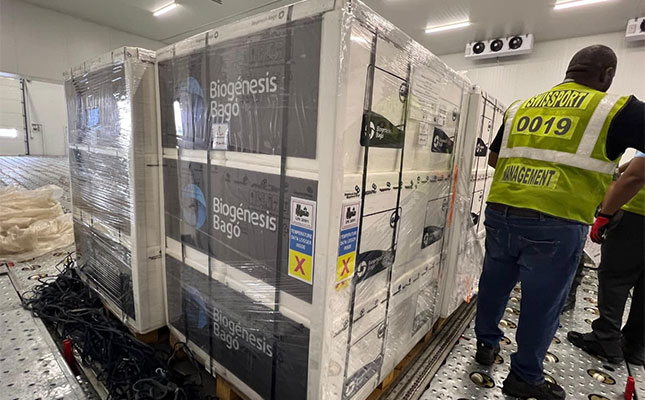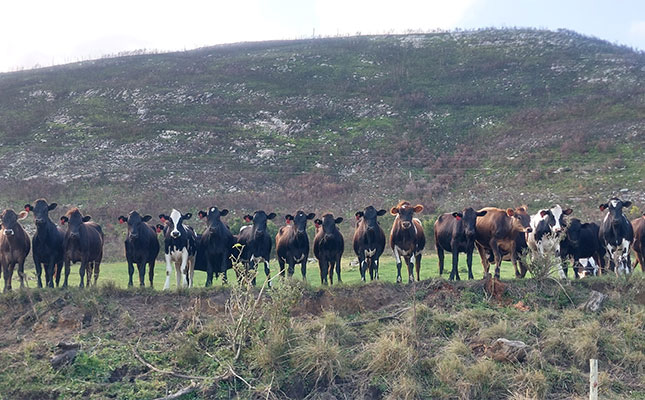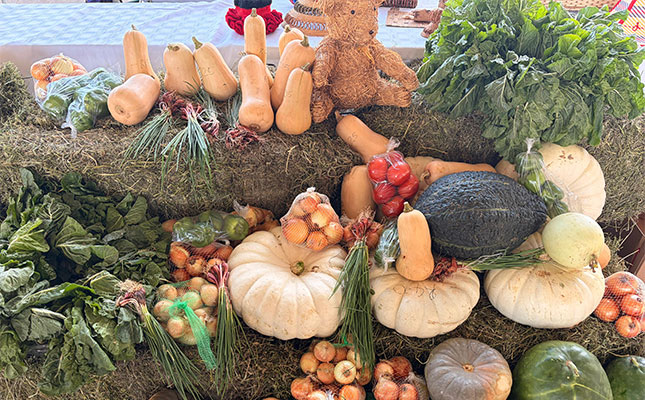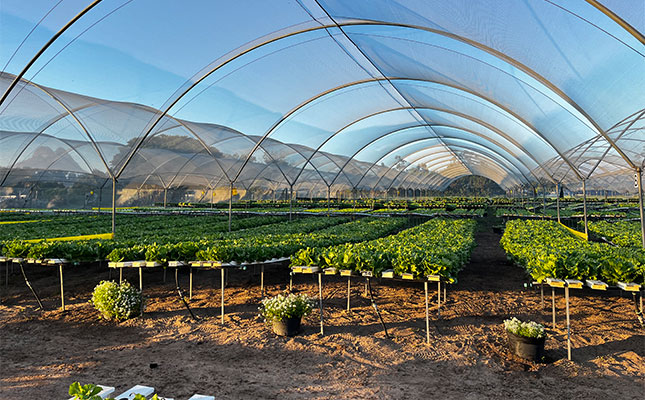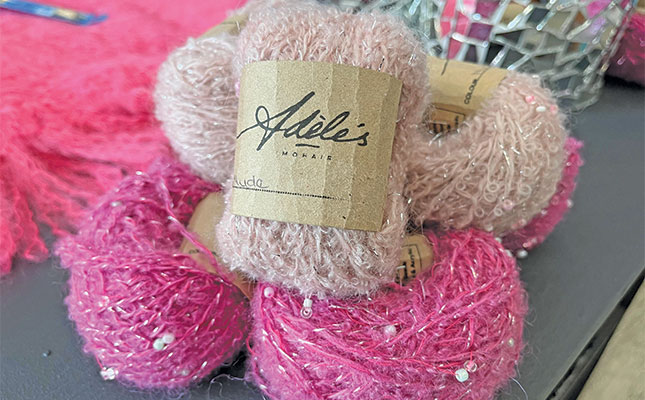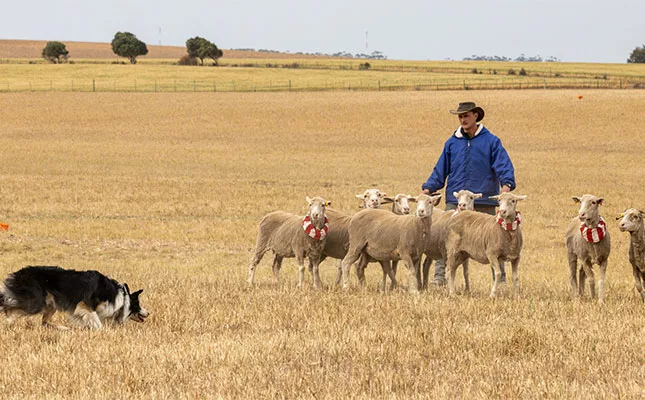
Laura Sterley, promotional officer for the South African Sheepdog Association (SASDA), told Farmer’s Weekly that spectators were kept on the edge of their seats as some of the country’s best handlers and dogs battled it out for first place.
Andrew Philip, who won the championships in 2014, 2015, 2016, and 2017 with his dog Mirk, looked set for another victory after scoring 101 points in the semi-finals. Fourie and Wimpie were hot on their heels with 100 points.
The finals, however, turned the tables. Fourie and Wimpie edged ahead with 133 points, narrowly beating Philip and Mirk’s 132. Third place went to veteran handler Henry van der Merwe and his dog Lisa, who scored 127 points, proving that even in his eighties, Van der Merwe remains a formidable competitor.
A stalwart of the sport, Van der Merwe has been competing since 1980, and he and his dogs secured championship titles in 1987, 1988, 1989, 1991, 1996, 1998, 1999, 2009, 2018, and 2021.
At this year’s competition, WA Hugo and his dogs Adam and Sally were crowned Brace Champion. In the brace class, two dogs of similar appearance work together in unison.
Sterley pointed out that SASDA had received five spots in the 2026 World Sheepdog Championships, officially known as the International Supreme. However, their participation would greatly depend on their ability to raise funds to subsidise the cost of sending participants to Scotland, where the competition will be held in September.
“The cost of merely sending a dog to Scotland is around R80 000,” she said.
She added that it would be great to see more South Africans compete internationally, as our dogs and handlers were of excellent quality, as confirmed by international judges invited to judge the South African championships.
A test of nerve and skill
Fourie, who admitted he still could not quite believe his win, described the South African National Sheepdog Championship as the highlight of the year: “The event gives handlers the chance to measure themselves against one another under the watchful eye of an international judge – this year, Andrew Dickman from Scotland.”
He explained that the final was especially nerve-racking as the course became a full-sized international double lift. Two flocks of 10 sheep were used, with five in each flock marked with collars.
The dog must first gather one flock, then fetch the second before completing a full drive and moving to the shedding ring. There, handler and dog must separate the five marked sheep from the 20 and pen them, all within 25 minutes.
“It’s a thorough test of your understanding of sheep behaviour, time management, your relationship with your dog, and how well you work together,” Fourie said.
He added that many factors could affect a run: “For success, you, your dog, the sheep, and the weather must all play along. Everything can go haywire if you get a difficult sheep, the wind prevents your dog from hearing you properly, you misjudge your timing, or there is some kind of misunderstanding between you and your dog. Having all these work together really is grace from above.”
For Fourie, the true reward is not just victory, but the satisfaction of a run well done: “There is nothing more satisfying than completing a trial like that and knowing your hard work and training have paid off. Then it doesn’t really matter whether you win or not.”
More than just a dog
Three-year-old Wimpie first competed in last year’s junior championship, where he claimed the Junior Reserve Champion title.
Fourie described him as a good-natured, hardworking companion who always gave his best when working sheep: “Wimpie is more than just a dog to me. He is my work colleague and best friend. He was bred from one of my other sheepdogs, Kwagga, and a bitch I borrowed, Kayla, to lighten Kwagga’s load as he got older.”
Fourie only keeps male dogs and breeds new ones when he needs replacements. Kwagga, now nine years old, retired from competing this year. His work on the farm was also being scaled down, though Fourie admitted this was difficult because of the dog’s huge appetite for work.
“Kwagga was my first real farm dog. Buying him was risky as he was untrained and kept in a kennel, but I had a good feeling about him. I was also a novice and made a few mistakes during training, but we ‘clicked’ and had a lot of grace for one another.
“What makes [Kwagga] most special is his reliability. If I see the sheep coming but not him, I know something is wrong. He is also strong enough not to be intimidated by ewes with lambs. For me, he is the ideal sheepdog,” Fourie explained.
Wimpie was one of nine puppies and stood out early as the most independent, driven, and playful of the litter.
While Wimpie was making a name for himself in competitions, Fourie pointed out that he was first and foremost a working dog, helping him manage sheep on the Klipfontein and Klipkraal farms near Sutherland in the Western Cape.
“Sheep work is the primary goal of these dogs. They substantially ease the workload and often allow me to do the work of three or four men. Currently, we are moving sheep up an 800m elevation over 20km to 25km,” he added.
Fourie said he and the dogs primarily participated in trials as a distraction from their hard work: “For us, it is a way of taking a break or going on a holiday.”
Preparing for trials
For Fourie, the main difference between trial and working dogs lay in their endurance and drive: “A work dog can go for hours on the farm, while trial dogs usually need more rest. Wimpie works at the same pace I do, resting only when I do. Dogs like mine, however, would be a handful for someone who doesn’t have as many sheep to work.”
To prepare for trials, the dogs do their ordinary farmwork, which helps build stamina, increase fitness, and improve their feeling for the sheep. Closer to the nationals, the dogs also train on smaller flocks of sheep, as this requires finer movements than when working with large flocks. Practice, for instance, might include the separation of teasers from the rest of the rams.
“Those big movements that work in large flocks can easily put a sheep off course in a small group. So, the dogs need to be extremely obedient and react with precision to successive instructions,” Fourie explained.
While he was strict about them following his voice, he sometimes kept quiet to allow the dogs to follow their own minds: “While doing this, I might give a grunt to indicate I do not like something. I feel that allowing dogs to do this helps them develop their natural ability to work the sheep.”
Fourie treats his dogs like family. They sleep in the house and travel with him on ‘holidays’, which are usually sheepdog trials.
“There is nothing I enjoy more than spending time with my dogs and watching them grow into their potential. They can do so much more than people realise. It truly is a privilege to work with a good sheepdog and experience first-hand how they ease your work and enrich your life,” he concluded.
Get trusted farming news from Farmers Weekly in Google Top Stories.
➕ Add Farmers Weekly to Google ✔ Takes 10 seconds · ✔ Remove anytime

